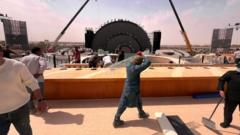Despite government claims of improved safety measures, reports reveal that many deaths result from preventable accidents and are often misclassified, leaving grieving families uncompensated.
**Rising Alarm Over Migrant Worker Deaths Ahead of Saudi Arabia's World Cup Preparations**

**Rising Alarm Over Migrant Worker Deaths Ahead of Saudi Arabia's World Cup Preparations**
Human rights organizations highlight a troubling increase in fatalities among migrant workers in Saudi Arabia as the nation gears up for the 2034 World Cup.
Human rights groups are raising serious concerns about a significant increase in the number of deaths among migrant construction workers in Saudi Arabia, coinciding with the nation's preparations to host the World Cup in 2034. Reports by Human Rights Watch and FairSquare published today reveal that many workers are succumbing to preventable workplace accidents, raising alarms about labor conditions in the country.
Minky Worden, the director of Global Initiatives at Human Rights Watch, warned that while the 2034 World Cup is projected to be the largest and most expensive ever, it might also come at an unimaginable human cost. With millions of migrant laborers tasked with erecting vital infrastructure, including 11 new stadiums, a transportation network, and 185,000 hotel rooms, the risks are mounting.
These warnings follow a visit made by FIFA President Gianni Infantino to Saudi Arabia, where he met with Donald Trump at a US-Saudi investment forum. Although FIFA maintains a commitment to uphold and promote human rights, Human Rights Watch criticizes the organization for not learning from the migrant labor fatalities linked to the 2022 Qatar World Cup.
Accurate data on migrant worker deaths is scarce in Saudi Arabia, which imposes severe restrictions on human rights organizations and prohibits labor unions. However, Human Rights Watch conducted interviews with the families of 31 workers from countries like Bangladesh, India, and Nepal, many of whom met tragic ends due to fall injuries, machinery accidents, and electrocution. The intense heat of the region further complicates the safety of these laborers, many of whom already work in life-threatening conditions.
In previous statements, the Saudi government insisted on its achievements in improving occupational health and safety, citing decreasing death and injury rates. FIFA has also praised the kingdom's efforts in reforming labor laws since 2018. However, the global construction workers’ union BWI observes a concerning uptick in preventable accidents, citing systemic negligence, corruption, and inadequate regulatory oversight.
Additionally, FairSquare reports that the kingdom's medical authorities seldom perform autopsies to clarify the causes of these migrant deaths. FairSquare's co-director, James Lynch, emphasized the peril faced by thousands of workers, many of whom leave behind families who may never learn the truth about their loved ones' deaths. He criticized FIFA's human rights policies as insincere, stating that while such entities benefit financially from Saudi Arabia's positive portrayal, the families left behind in countries like Nepal are devastated.
In an effort to improve conditions, FIFA announced intentions to institute a workers' welfare system to enforce mandatory standards concerning construction and services associated with the World Cup. While FIFA expressed confidence in creating effective measures for worker protection, Human Rights Watch criticized the lack of detailed information about the implementation of this system.
The organization calls for rigorous investigations into all migrant worker deaths, regardless of the perceived cause, and insists that families receive appropriate compensation and are treated with dignity in their times of grief. The BBC has reached out to Saudi authorities for their perspective on these pressing concerns.
Minky Worden, the director of Global Initiatives at Human Rights Watch, warned that while the 2034 World Cup is projected to be the largest and most expensive ever, it might also come at an unimaginable human cost. With millions of migrant laborers tasked with erecting vital infrastructure, including 11 new stadiums, a transportation network, and 185,000 hotel rooms, the risks are mounting.
These warnings follow a visit made by FIFA President Gianni Infantino to Saudi Arabia, where he met with Donald Trump at a US-Saudi investment forum. Although FIFA maintains a commitment to uphold and promote human rights, Human Rights Watch criticizes the organization for not learning from the migrant labor fatalities linked to the 2022 Qatar World Cup.
Accurate data on migrant worker deaths is scarce in Saudi Arabia, which imposes severe restrictions on human rights organizations and prohibits labor unions. However, Human Rights Watch conducted interviews with the families of 31 workers from countries like Bangladesh, India, and Nepal, many of whom met tragic ends due to fall injuries, machinery accidents, and electrocution. The intense heat of the region further complicates the safety of these laborers, many of whom already work in life-threatening conditions.
In previous statements, the Saudi government insisted on its achievements in improving occupational health and safety, citing decreasing death and injury rates. FIFA has also praised the kingdom's efforts in reforming labor laws since 2018. However, the global construction workers’ union BWI observes a concerning uptick in preventable accidents, citing systemic negligence, corruption, and inadequate regulatory oversight.
Additionally, FairSquare reports that the kingdom's medical authorities seldom perform autopsies to clarify the causes of these migrant deaths. FairSquare's co-director, James Lynch, emphasized the peril faced by thousands of workers, many of whom leave behind families who may never learn the truth about their loved ones' deaths. He criticized FIFA's human rights policies as insincere, stating that while such entities benefit financially from Saudi Arabia's positive portrayal, the families left behind in countries like Nepal are devastated.
In an effort to improve conditions, FIFA announced intentions to institute a workers' welfare system to enforce mandatory standards concerning construction and services associated with the World Cup. While FIFA expressed confidence in creating effective measures for worker protection, Human Rights Watch criticized the lack of detailed information about the implementation of this system.
The organization calls for rigorous investigations into all migrant worker deaths, regardless of the perceived cause, and insists that families receive appropriate compensation and are treated with dignity in their times of grief. The BBC has reached out to Saudi authorities for their perspective on these pressing concerns.




















